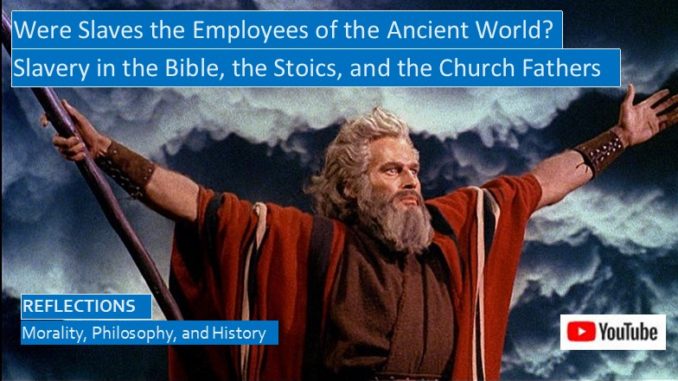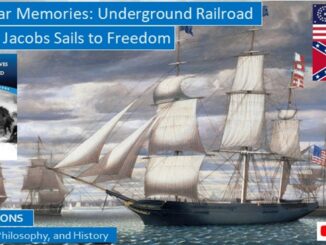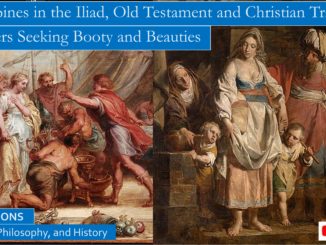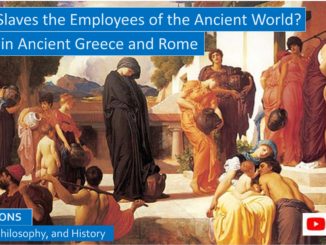
Slaves were the employees of the ancient world, many scholars estimate that perhaps a third of the Athenian workers were slaves, and perhaps half or more of the Roman slaves. Kenneth Harl, a professor of many Great Courses lecture series, states that after the decline of the Roman Empire the supply of new male slaves was cut off from the great plantations that employed vast slave gangs, and that over the course of many centuries in Europe the Roman system of slavery evolved into the system of serfdom in Medieval Europe, although history is silent on exactly how this transition occurred.[1] McGuckin speculates that the evolving teaching of the church on the evils of slavery helped the evolution of serfdom by the seventh century.[2] Serfdom was like slavery in that the serfs were bound to the landed estate in which they were born, but since they were permitted to have a home life with stable families, they were no longer chattel property, and could not be bought and sold.
How should we define slavery? If someone is more like a serf who cannot be bought and sold as if they were talking livestock, does that mean they are not slaves? Many serfs lived lives of complete destitution and were nearly as impoverished as slaves were, would it be fair to say that serfs were not slaves? What about workers who today earn a minimum wage that does not come close to being a living wage, would it be fair to say they are not slaves?
In our first blog we study St Paul’s exhortations in the Book of Ephesians, replacing the words SLAVE and MASTER with EMPLOYEE and MANAGER and we find that indeed these bible passages that say slaves should submit to masters, and that masters should respect the dignity of slaves can be simply applied allegorically to employees and managers. Similar passages are found in 1 Timothy, Colossians, and Titus.
In our first blog we discuss how the terms servant and slaves are somewhat interchangeable, just as serfs are not that different from slaves. In the Old Testament servants can be part of the family, Abraham trusts his oldest servant with a camel loaded with dowry goods to cross the desert to the tent of his cousin Laban and trusts his servant to return with Laban’s virtuous daughter Rebekah to wed his son Isaac. And we discuss a remarkable recent story of a Filipino maid who became an unwilling part of an American family, she was trapped in her situation.
In this blog we examined the life of slaves in ancient Greek and Rome in particular:
http://www.seekingvirtueandwisdom.com/slaves-in-ancient-greece-and-rome-blog-2/
Please view our YouTube video on slavery: https://youtu.be/poyvJajCXnE
When Americans think of slavery, they think of the pre-Civil War chattel slavery of the Deep South. The international slave trade was abolished in the United States in 1808, but in line with Law of Unintended Consequences, this made the system of slavery even more cruel. The fertile black-belt cotton plantations of Alabama and Mississippi that expanded in the decades before the Civil War created an insatiable demand for slaves, and slave-owners in the older Upper Southern states found that slaves were often a more profitable commodity than cotton, tobacco, and rice, which broke up many slave families, often small children were separated from their mothers soon after they learned to walk. Slave owners consciously forced the breeding of slaves for profit.
These were the general categories of slaves in both ancient and modern slave societies:
- Household servants, and small farm hand slaves. This was often a milder form of slavery, sometimes servants were treated like a part of the family.
- Concubines, both consenting and unwilling, often captured in war.
- Least numerous: Independent city slaves who were tradesmen. Often, they were allowed to retain some of proceeds from their trade and buy their freedom. This type of slave was less common in the Deep South, more common in ancient Greece and Rome.
- Slaves who worked for the city or state, or in factories.
- Most numerous: Field hands for large plantations, worked under overseer’s whip. Since the slave-owner had minimal contact with these slaves, their lives could be quite harsh. McGuckin mentions that many POW’s were enslaved to work the large ancient Roman plantations.[3]
- Often a death sentence: Slaves who worked in mines.
In the ancient world, some slaves were captured by pirates, or captured in battle as prisoners-of-war. When an enemy city was captured after a long and bitter fight, the women and children were often sold into slavery, and the fighting men either executed or enslaved to work in the mines, or sometimes as plantation slaves.
One ugly truth of all slave societies was that since the master had total control over his slaves, he could force himself on any of his female slaves, and she had absolutely no recourse.[4] Concubines, and the capturing of concubines in war, was a leading theme of the Iliad, and is also specifically mentioned in the Jewish Torah, as we discussed in these blogs:
http://www.seekingvirtueandwisdom.com/iliad_blog02/
http://www.seekingvirtueandwisdom.com/iliad-blog-3-visiting-the-enemy-camp-greeks-vs-indians/
Frederick Douglass discusses how female slaves in Maryland, where he grew up as a slave, were often forced to be concubines, including his mother, and how many slave families were broken up:
SLAVERY IN THE BIBLE AND WORKS OF THE EARLY CHURCH FATHERS
Although the Bible does not specifically condemn slavery, the Bible does encourage us to treat all of our fellow men with dignity and respect, whether they are slave or free. In succeeding centuries, several early Church Fathers either condemned the institution of slavery or tried to weaken its grasp. The Old Testament tried to limit the practice of lifelong slavery, there was the Jubilee system where slaves were freed every seven years, and Deuteronomy established cities of refuge where escaped slaves from surrounding countries could flee.[5] Likewise, in New Testament times when Christians were few, St Paul may have been concerned that Christians might face official resistance if they even hinted that slavery was contrary to Christian values,[6] cautions he raised with Timothy, “Let all who are under the yoke of slavery regard their masters as worthy of all honor, so that the name of God and the teaching may not be blasphemed.”[7]
St Paul exhorts us in Galatians: “There is no longer Jew or Greek, there is no longer slave or free, there is no longer male and female; for all of you are one in Christ Jesus.”[8] “And because you are children, God has sent the Spirit of his Son into our hearts, crying, ‘Abba! Father!’ So you are no longer a slave but a child, and if a child then also an heir, through God.”[9]
In 1 Corinthians St Paul says all are free before Christ: “Were you a slave when called? Do not be concerned about it. Even if you can gain your freedom, make use of your present condition now more than ever. For whoever was called in the Lord as a slave is a freed person belonging to the Lord, just as whoever was free when called is a slave of Christ. You were bought with a price; do not become slaves of human masters. In whatever condition you were called, brothers and sisters, there remain with God.”[10]
Included in the New Testament is the Book of Philemon, where a slave who escaped from an acquaintance of St Paul visits him in prison. Perhaps he had been mistreated, in this short epistle St Paul sends him back to his master with instructions to treat him as a brother in Christ: “Perhaps this is the reason he was separated from you for a while, so that you might have him back forever, no longer as a slave but more than a slave, a beloved brother—especially to me but how much more to you, both in the flesh and in the Lord. So if you consider me your partner, welcome him as you would welcome me. If he has wronged you in any way, or owes you anything, charge that to my account.”[11]
The acceptance of slavery shifted over time. In Ancient Greece, Aristotle defended slavery by the assertion that slaves were fated to be slaves by their character, this attitude is countered by the biblical citations that both free and slave are created equally in the image of God.[12] St Gregory of Nyssa reaffirms this passage, teaching us further that “God creates humanity for no other reason than his innate goodness,” and all men “equally bear in themselves the divine image.”[13] But the Apostolic Constitutions do not regard slavery as a natural condition, the freeing of slaves is encouraged, and when a slave owner free his slaves, this was seen as a type of forgiveness of sins.[14]
St Gregory of Nyssa teaches us, “Among the vanities listed in Ecclesiastes are an expensive home, many vineyards, lovely gardens, pools and orchards. Here we also find the man who regards himself as lord over his fellow man, for he writes, ‘I obtained servants, maidens, slaves born to me in my house.’ Can you see here that pride that originates false pretensions?” This kind of person gives “himself power over the human race as if he were its lord.” “Like a sinner and a rebel against the divine commandment, you have put man himself under the yoke of servitude, when he was created as lord over the earth. You have forgotten the limits of your authority, which consists in dominion only over the brutish animals.” How can you say that you “have servants and maidens as if they were goats or cattle?”[15]
St Gregory’s mentor, Bishop Eustathius, encouraged a monasticism of simple living that renounced degrees of rank and privileged, and this radical teaching led to a synod being called that expressed concern monasteries might tempt monastics to abandon their worldly responsibilities as husbands or slaves.[16] Likewise, the writings of St Ephrem also suggest that slaves should be freed when they can join a monastery.[17] This issue was addressed in the Council of Chalcedon in 451 AD, whose canons permitted a slave to become a monk with permission of his master, and if a runaway slave became a monk and was not detected for a year, then he would be free.[18] This demonstrates the evolution of the teaching of the church regarding slavery.
McGuckin states that St Augustine had a practical philosophy regarding slavery. St Augustine teaches us that “abolishing slavery, although it is a sinful alienation form the standards of love, would cause too much social unrest. In the present state of the world, it ought to be endured.” This opinion was influential throughout the Middle Ages. But by his actions St Augustine showed that slavery should be resisted. Since many slaves were captured by pirates, St Augustine once encouraged his congregants to free the slaves on a transport ship that mistakenly docked in the local harbor. But St Augustine did not condone his enemies, the Donatists, when they torched slave-owning plantations, freeing the slaves.[19]
St John Chrysostom was known for scolding the rich for their oppression of those who are poor. He asks the rich, “Why do you keep so many slaves?” We should dress and eat only according to our need, what is our need for slaves? “We have no need at all. One master should only employ one servant.” “For God made everyone well capable of attending to themselves and to their neighbor as well.” “That is why God gave us hands and feet in the first place, so that we might not stand in need of servants. You see, the class of slave was not introduced out of any perceived need, otherwise when Adam was made, slaves too would have been formed. No: It is the penalty of sin and disobedience that accounts for the introduction of slaves.”
St John Chrysostom teaches us that we should care for the welfare of our slaves. “If you have any care for your slaves, do not employ them in serving your own needs; rather, when you have purchase them, then teach them trades so they can support themselves, then set them free.” Modern day employers should likewise be sure their employees have the training they need so they are always employable. St John Chrysostom continues, “but if you scourge your slaves or put them in chains, this is not humane.”[20]
In the City of God, St Augustine restates the instructions of St Paul in Ephesians, “This is the origin of domestic peace, and the well-arranged concord between those in the family who rule and those who obey. For it is the ones who care for the rest who rule: the husband over the wife, the parents over the children, the masters over the servants. And those who are cared for should obey: women over husbands, children their parents, servants their masters. Even so, in the family of a just man who lives by faith,” “even those who rule are servant to those whom they seem to command.”
But then St Augustine specifically condemns slavery, he teaches us that “the condition of slavery is the result of sin. That is why we do not find the word slave in any part of Scripture until Noah branded the sin of his son with this name. Slavery, therefore, is introduced to the world by sin and not by nature.” In Latin, the word for slave stands for POW’s who “were afterward called servants. But these circumstances could never have arisen except as a result of sin.”[21]
[1] Kenneth Harl, probably lectures on The World of Byzantium, or the Fall of the Pagans and the Origins of Medieval Christianity, 2011, https://www.thegreatcourses.com/courses/fall-of-the-pagans-and-the-origins-of-medieval-christianity
[2] John Anthony McGuckin, The Path of Christianity, the First Thousand Years; Church and Slavery in an Age of Oppression (Dovers Creek, Illinois, IVP Academic Press, 2017), p. 1074.
[3] John Anthony McGuckin, The Path of Christianity, the First Thousand Years; Church and Slavery in an Age of Oppression, p. 1060.
[4] John Anthony McGuckin, The Path of Christianity, the First Thousand Years; Church and Slavery in an Age of Oppression, p. 1060, and this is discussed in many other of my blogs.
[5] John Anthony McGuckin, The Path of Christianity, the First Thousand Years; Church and Slavery in an Age of Oppression, p. 1058.
[6] John Anthony McGuckin, The Path of Christianity, the First Thousand Years; Church and Slavery in an Age of Oppression, p. 1067.
[7] https://www.biblegateway.com/passage/?search=1+timothy+6%3A1&version=NRSVCE
[8] https://www.biblegateway.com/passage/?search=galations+3%3A28&version=NRSVCE
[9] https://www.biblegateway.com/passage/?search=galations+4%3A6-7&version=NRSVCE
[10] https://www.biblegateway.com/passage/?search=1+Corinthians+7%3A21-24&version=NRSVCE
[11] https://www.biblegateway.com/passage/?search=Philemon+1%3A15-18&version=NRSVCE
[12] John Anthony McGuckin, The Path of Christianity, the First Thousand Years; Church and Slavery in an Age of Oppression, p. 1059, see footnote 2.
[13] John Anthony McGuckin, The Path of Christianity, the First Thousand Years; Church and Slavery in an Age of Oppression, pp. 1081-1082, quoting St Gregory of Nyssa, De Oficio Hominis.
[14] John Anthony McGuckin, The Path of Christianity, the First Thousand Years; Church and Slavery in an Age of Oppression, p. 1080.
[15] John Anthony McGuckin, The Path of Christianity, the First Thousand Years; Church and Slavery in an Age of Oppression, pp. 1083, 1085, quoting St Gregory of Nyssa, Homily 4 on Ecclesiastes.
[16] John Anthony McGuckin, The Path of Christianity, the First Thousand Years; Church and Slavery in an Age of Oppression, pp. 1062-1063, and footnote 6.
[17] John Anthony McGuckin, The Path of Christianity, the First Thousand Years; Church and Slavery in an Age of Oppression, p. 1085.
[18] John Anthony McGuckin, The Path of Christianity, the First Thousand Years; Church and Slavery in an Age of Oppression, p. 1072.
[19] John Anthony McGuckin, The Path of Christianity, the First Thousand Years; Church and Slavery in an Age of Oppression, pp. 1069, 1087.
[20] John Anthony McGuckin, The Path of Christianity, the First Thousand Years; Church and Slavery in an Age of Oppression, p. 1087, quoting St John Chrysostom, Homily 40 on 1 Corinthians.
[21] John Anthony McGuckin, The Path of Christianity, the First Thousand Years; Church and Slavery in an Age of Oppression, pp. 1087-1088, quoting St Augustine, City of God, Book 19.




8 Trackbacks / Pingbacks